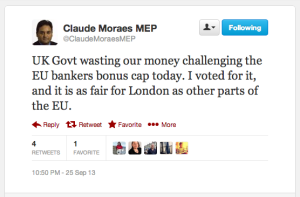 So the UK has lodged a legal challenge with the European Court of Justice (ECJ) on new EU rules on pay in the banking sector, specifically about bankers’ bonuses (framed as “Osborne to take EU to court” (see FT for example)). The Gov.uk news story about it is here.
So the UK has lodged a legal challenge with the European Court of Justice (ECJ) on new EU rules on pay in the banking sector, specifically about bankers’ bonuses (framed as “Osborne to take EU to court” (see FT for example)). The Gov.uk news story about it is here.
There are for me two issues at stake here: the political, and the legal and procedural. Much of the reaction to the news has completely messed up this distinction.
Take these two tweets for example, from Claude Moraes MEP (Labour) and Daniel Hannan MEP (Tory):
UK Govt wasting our money challenging the EU bankers bonus cap today. I voted for it, and it is as fair for London as other parts of the EU.
— Claude Moraes (@Claude_Moraes) September 25, 2013
Instead of private sector pay, why don't MEPs try to control Eurocrats' remuneration? That's meant to be our job. @Hannes_Swoboda
— Daniel Hannan (@DanielJHannan) September 26, 2013
Moraes, rather than stating that the Tory government is politically wrong to try to overturn the new bankers’ bonus rules, instead plays a legal cost argument. For someone like Moraes, the Tories should be politically or ideologically wrong to challenge the bonus cap, but it should procedurally be fine for any government to test the legality of EU law.
Hannan tries another tactic. His tweet sounds like a judgment about what MEPs should be for – that they should be looking at Eurocrats’ pay, and not bankers’ pay. But this is essentially a political point, dressed up as procedure. Whether you cap bankers’ bonuses or not is a matter of political ideology, not a question of what MEPs are for.
We would all be better off if those defending the bonus cap did so on principle, and those opposing it also did so on principle. Then we let the legal process run its course to see whether the proposal as it currently stands is legal or not.








Same problem here:
The UK launched a legal challenge to EU rules capping bank bonuses on Wednesday (25 September), claiming that limits on pay would do nothing to make the financial sector safer.
Well, they may have claimed that, but it isn’t the basis of their legal challenge. Can someone please tell me what they’re claiming in front of the Court?
Ah, there it is, 6 paragraphs further down:
UK officials claim that the bonus cap provisions breach the EU treaty and that the powers delegated to the European Banking Authority go beyond its remit of setting technical standards for the bloc’s banks.
But then, almost immediately after, we get the statement from the Treasury:
“Britain has been at the forefront of global reforms to make banking more responsible, including big reductions in upfront cash bonuses and linking rewards to long-term success,” the UK treasury said in a statement.
A UK official said the rules would lead to a rise in fixed salaries and do little to curb reckless trading in the financial sector.
He added that the UK had already imposed tough tax rates on bank bonuses at national level.
“This is not about protecting bank bonuses,” he said, adding that the measures had “consistently reduced bonus pots”.
Let’s not forget that the UK is also challenging the financial short selling rules and even the creation of the European Banking Authority. Today the Guardian is reporting that the UK is blocking the new data protection regulation and on Thursday it lost a challenge to prevent the EU’s social security legislation being extended to the EEA. Pretty clear whose interests are driving the running of this country and it’s not those of the average joe.
MEPs have already limited Eurocrats’ pay, the first major cuts came in 2004 and then again a couple of months ago. Thanks to the reforms, the lowest-earning staff will be taking home less than the minimum wage in Luxembourg.
Claude Moraes and Mary Honeyball got 21.3% of the vote in London, not far behind the Tories at 27.4%. Not sure what is the legitimacy problem there.
94% of the area represented by Claude Moraes and his fellow Labour MEP, Mary Honeyball, didn’t vote for either of these two individuals.
The oft-described new power of the EU parliament was granted by the Lisbon Treaty, which has been given no mandate from the peoples of the EU.
Moraes and the EU parliament have no legitimacy or right to influence the economic arrangements of sovereign countries.
We collect 45% of the bankers bonus remuneration as tax we need that income to pay for our services. We are not in the business of collecting taxes for other countries, why not introduce a levy on trade within the single market which wont effect our services sector because they still haven’t given us access to the market. Our biggest industry already has its hands tied behind its back by the EU & now it wants to introduce another tax to batter it even more. What should happen is that we should withhold 10 to 14% of our donations to the EU to compensate for the fact our biggest industry still has not access to the market place. What would happen if the Car industry was taken outside the Single market & then levied with a tax for good measure?